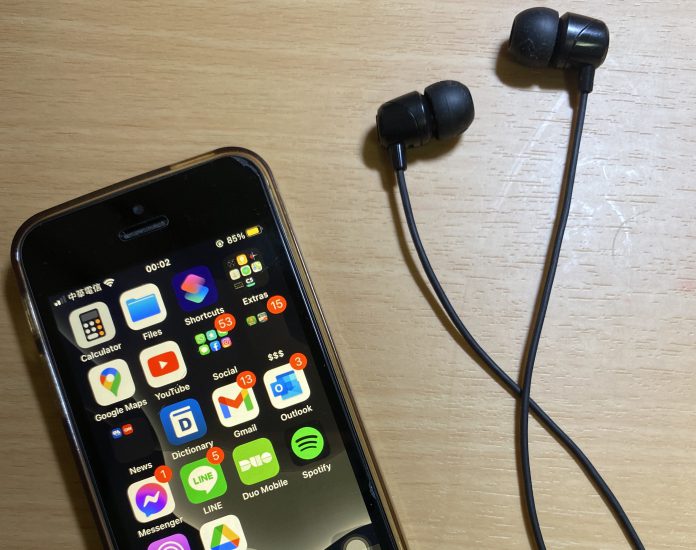Podcasters in Taiwan witness a growth in the industry during the pandemic.
By Charleen Chen in Hsinchu
Huang Jhih-ping spends three to four hours listening to podcasts every week. “I listen to podcasts whenever my hands are busy, such as commuting, doing the dishes, and riding a bike,” he says.
Podcasts helped the Taiwanese student, who started the habit in 2019, pass time during the pandemic when he was attending an exchange programme in Switzerland. “I was stuck in my room because all stores were closed,” he says.
“I felt bored staying in my room, so I listened to podcasts, such as the show hosted by Froggy Chiu,” he says.
Chiu is a Taiwanese politician and YouTuber, who launched his podcast in 2019 commenting on social issues in Taiwan.
The global studies major student Huang thinks podcasts are informative and entertaining. “They allow me to make better use of time. I can gain new knowledge when commuting,” he says.
Breaking Time Constraint
The term “podcasting” was coined by The Guardian journalist Ben Hammersley in 2004, who combined “iPod” and “Broadcasting”.
According to Apple, podcasts are audio shows composed of individual episodes.
Huang listens to news podcasts that address current affairs and issues on Spotify. He is a fan of Bailingguo News (百靈果News) and The Reporter (報導者).
Spotify is a Swedish-based audio and video streaming service provider, launched in 2008.
According to the company’s 2019 annual report, there were over 500,000 podcasts on the platform. The company witnessed a 200 per cent increase in podcast listening from 2018 to 2019.
“Spotify makes listening to podcasts relatively easy. I can switch between music and podcasts on one single platform,” Huang says.
University student Pang Yun-chi shares Huang’s thoughts.
“I want to learn something new by listening when my hands are busy. Listening to music turns out to be quite monotonous,” the business major student says.
Pang started listening to podcasts on Spotify in 2018, when she was commuting, cooking, and cleaning.
“I hope I can gain new knowledge from podcasts, especially language skills,” the Chinese University of Hong Kong student says.
She subscribes to chat shows in which podcasters speak in English or Cantonese, such as On the Floor and Alohagwa. “Because of the pandemic, I cannot go back to Hong Kong at the moment. But I am trying to brush up my Cantonese,” Pang says.
“I also listen to Talent Connect. You know, career preparation is the most urgent thing for seniors now. The show invites practitioners from technology industries to share their work experiences,” the Year Four student says.

Rapid Development in Taiwan
Kuo Yan-hsin, a part-time podcaster, has been working on user growth in SoundOn since March, 2020.
SoundOn, a Taiwanese podcast company which provides hosting service, was founded in 2019. It helps podcasters store and distribute their podcasts’ audio files.
Kuo says there are three factors contributing to the rapid development of podcasts in Taiwan.
“First, the prevalence of Chinese contents lowers the barriers to enter the industry,” she says.
She points out before SoundOn was founded, most resources for podcasters to start their business were in English, posing challenges to producers who wanted to create podcasts for Chinese audiences.
“Second, the bluetooth headsets optimise the experience of listening to podcasts. Users find wireless earphones much more convenient than traditional ones,” Kuo says.
“Lastly, the pandemic helps the podcast industry grow when listeners get more free time staying at home. They spend more time on podcasts,” she says.
According to Kuo, the total podcasts hosted by SoundOn has increased from 700 to 3,500 from April to September in 2020.
Hsieh Lu-yang is a freelanced Taiwanese podcaster. She also witnesses market growth in the industry.
“In terms of the total number of listens per episode, the number doubles from 10,000 in the first quarter to 20,000 in the third quarter of 2020,” Hsieh cited her show as an example.
Different from Kuo, she thinks the growth in podcast listening results from the increase in podcast shows. “YouTubers and KOLs who join podcasts production also contribute to the growth, since they have already built their audience base,” Hsieh adds.
Hsieh started her podcast show Sex Chat in April, 2019. “I want to record my learning process of sex and ‘debug’ the problem that women rarely talk about sex,” she says.
Hsieh interviews experts from medical field and the LGBTQ community to share sexual knowledge and advice.
“Some write me letters about their sexual concerns or thoughts,” she says. Making use of her podcast show as an open forum, Hsieh reads letters in her show. “Many audiences really like this part, because they can relate to others’ experiences,” she says.
“Those who enjoy my podcast say the content is really genuine and down-to-earth. They like the way I share my opinions from an ordinary person’s viewpoint,” she says.
“Podcasters in Taiwan have to start embedding advertisements into their shows to sustain the business.”
Tony Chou, a Taiwanese podcaster based in Toronto, says many of his audiences are commuters who love the sense of companionship of podcasts. Chou and Esther Tu, co-host of the show, launched On the Way to Work in May, 2020.
The podcast provides the latest business news every day, focusing on global economy and business. It reaches 4.9 out of 5 on Apple Podcast rating within six months.
Chou says reading news has always been his habit. He summarises news every day after the North American stock markets close, and he says the timing is good for the podcast production.
“Due to time difference, commuters in Taiwan can get the latest news in the morning,”he says.
Despite the rapid growth in the podcast industry during the pandemic, Kuo predicts the development will reach a plateau before long.
“The donations from the audiences are not enough. Podcasters in Taiwan have to start embedding advertisements into their shows to sustain the business,” she says.
Edited by Regina Chen







































